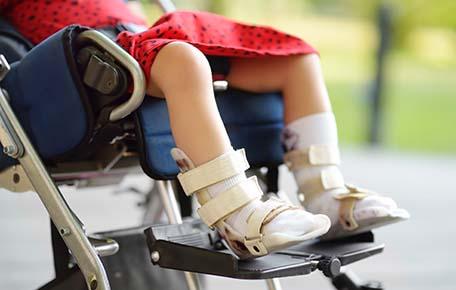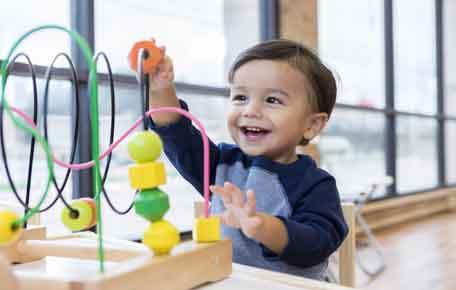Pediatric Neuromuscular Conditions
Make an Appointment
Finding out your child has a neuromuscular condition can feel overwhelming, no matter when it happens. Maybe your baby was diagnosed on their newborn screening. Sometimes it’s diagnosed in children when they’re toddlers. Sometimes the first signs show up in their teenage years. But no one ever feels prepared.
At UVA Health Children’s, our team of neuromuscular specialists are experts in treating these conditions. We’ve helped get new treatments through clinical trials. And we’ve researched new ways to get a diagnosis early.
We’re actively working to improve treatments for people with neuromuscular conditions. All in the pursuit of offering families like yours the best treatment possible.
Neuromuscular Condition Treatment at UVA Health Children’s
Pediatricians often refer children to us when they notice:
- Low muscle tone (hypotonia)
- Missed milestones related to movement and strength
- Weakness in the arms or legs
Diagnosing Neuromuscular Conditions
Depending on what your provider sees and your child’s medical history, we may use different tests to confirm the diagnosis. We have access to the full range of diagnostic equipment and tests.
- Imaging (X-rays, DEXA scan, ultrasound of muscles)
- Respiratory tests (sleep study, lung volume)
- Biopsies
- Heart testing (echocardiogram, electrocardiogram)
- Muscle function tests
- Lab work
- Nutrition and feeding studies
- Genetic testing
Treatment for Neuromuscular Disorders
We offer a wide variety of treatments. How we treat your child depends on what condition your child has. We can treat some conditions, like spinal muscular atrophy, with gene therapy. Medications are also useful for some neuromuscular conditions.
Most treatment plans include:
- Physical therapy
- Positioning aids, like wedge pillows or bolsters to offer added support
- Mobility aids, like walkers or wheelchairs
- Braces and splints
We’ll also help with incorporating other specialists into your child’s treatment plan. Neuromuscular conditions can affect every part of your child’s life. We want to make sure we’re helping in every way we can. Child psychologists can help your child emotionally process their condition. We can help with serious complications. We can also help find ways to support healing with nutrition and sleep.
Conditions We Treat
We offer treatment for many neuromuscular conditions, often in coordination across specialties. These are just some of the conditions that we see most frequently.
Muscular dystrophies, including:
- Duchenne
- Becker
- Limb-Girdle
- Myotonic dystrophy
Myopathies including:
- Mitochondrial
- Dematomycosis
- Polymyositis
Other neuromuscular conditions, including:
- Spinal muscular atrophy
- Peripheral neuropathy
- Myasthenia gravis
- Charcot-Marie-Tooth
- Multiple sclerosis
Neuromuscular Condition Treatment FAQs
If your child has been diagnosed with a neuromuscular condition, it's normal to have a lot of questions. Your provider will be best able to answer questions about your child's specific case. But here are some of the questions we see frequently.
What is neuromuscular disease?
Your child controls the muscles in their body with nerve cells. These are what let their brain “control” all activities, like walking, talking, and even eating.
With neuromuscular disorders, these nerve cells lose their ability to communicate with the brain or the muscle. Each neuromuscular condition is a little different. But what they all have in common is a loss of muscle control.
Can neuromuscular disorders be cured?
For many kids, there are effective treatments. But most are lifelong conditions.
Does getting tested for a neuromuscular disorder hurt?
Most conditions can be found with genetic testing. These tests use a cheek swab or blood sample and aren't painful.
Some tests, like muscle biopsies, can be uncomfortable. We’ll use painless techniques as much as we can. If we do need to do something uncomfortable, we’ll tell you in advance. We can also offer support throughout the process.
What causes neuromuscular disorders?
Most pediatric neuromuscular disorders are caused by a change in your child’s genes (genetic variation). These variations can be passed down in families (inherited). They can also happen randomly.
We’ll work with our genetics program to test your child. If their test is positive, we can also test the other members of your family, as needed.
Some neuromuscular conditions are also caused by autoimmune conditions.
How can I help my child with a neuromuscular disorder?
At UVA Health Children’s, families are an important part of the care team. We’ll talk to you about ways to stay involved in your child’s care. We'll also work with you to help them be independent.
- Clinical TrialsFind a Clinical Trial
At UVA Health Children’s, we stay on top of the newest innovations. Learn more about clinical trials, including gene therapy.
- Equipment HelpLearn About Orthotics
Positioning aids, braces, and mobility aids can help make life at home easier. We’ll help you find the right tools for your child (and make sure they fit comfortably).
- Refer a PatientPatient Referral
Are you a provider concerned about a patient with late or regressing motor development? Refer them to our clinic, and we’ll work together with you to give them the best care.


